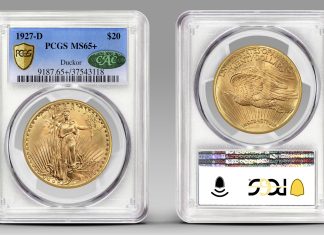 A US District Court Judge in Pennsylvania has ruled that the US government acted improperly in seizing what could be the most valuable US gold coins known to be in existence today.
A US District Court Judge in Pennsylvania has ruled that the US government acted improperly in seizing what could be the most valuable US gold coins known to be in existence today.
At the heart of the matter are ten 1933 Saint-Gaudens $20 Gold Double Eagles. These coins were said to have been found in 2003 in a safe deposit box originally belonging to jeweler Israel Switt, who passed away in 1990.
His heirs, daughter Joan Switt Langbord and her two sons Roy and David, retaining rights to the coins, handed them over to the US Mint in 2004 for authentication following an arrangement between the Langbord’s attorney, Barry Berke, and the US Mint.
Creating the crux of the issue is the fact that the 1933 Saint-Gaudens were never officially released by the US Mint. An executive order by President Franklin D. Roosevelt pulled the US from the gold standard in 1933, and actually made it illegal for Americans to own gold, except under special circumstances. As such, almost all of the 445,500 1933 Saint-Gaudens minted that year were were ordered to be melted down, along with all of the other gold coins turned in by citizens.
A handful of the 1933 coins escaped destruction. Over the years, the government has confiscated several of them found to be in the possession of individuals. In the 1990’s, the government again confiscated a 1933 Saint-Gaudens, this one believed to be previously owned by King Farouk of Egypt. A deal was struck with the new owner whereas the coin was sold in 2002 at auction for 7.59 million dollars to an unnamed bidder. Half of that amount went to the US Treasury and the other half to the coin’s owner.
The Langbords were hoping to reach a similar arrangement with the government, according to the ruling. The US Mint, however, accepted the coins, authenticated them and shortly thereafter informed the parties of their intent to keep the coins without compensation, indicating the Langbords had no legal claim to the Saint-Gaudens.
Believing the action to be a violation of their 4th and 5th amendment rights, the Langbords filed suit for recovery in 2006. The 4th Amendment protects against unreasonable search and seizures and the 5th Amendment guarantees a "due process" of law for private property taken for public use without compensation.
In the ruling, the Court responds to the accusation of the 4th Amendment violation when it states:
Accordingly, we find that the Government’s belief that the coins had been stolen did not diminish Plaintiffs’ Fourth Amendment rights and did not change the nature of the Government’s seizure…the seizure was objectively unreasonable and that the Government has presented no evidence from which a reasonable factfinder could conclude otherwise.
In response to the 5th Amendment allegations, the Court wrote:
…we find that the Government clearly deprived Plaintiffs of their due process rights by denying them a predeprivation hearing before a neutral official.
In the memorandum dated July 28, 2009, U.S. District Judge Legrome Davis has ordered the US Government to initiate a forfeiture hearing by Sept. 28 in order to retain possession of the coins. At this hearing, it is likely the government will have to prove that the Langbords are not the legal owners of the highly sought after Saint-Gaudens, and bear the burden of proving how they left the US Mint over 75 years ago.
For another perspective to include comments by the Langbord’s attorney Barry Berke, read the Bloomberg News article by Cynthia Cotts here. Another interesting take with post ruling comments is here, written by Maryclaire Dale of the AP.





